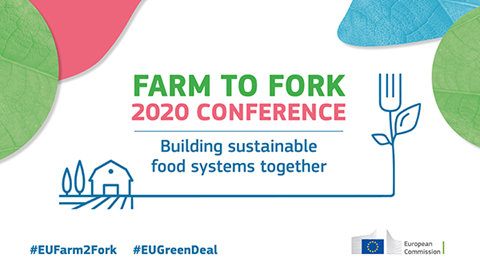On 15 and 16 October 2020 the European Commission organized the Farm to Fork 2020 Conference with the topic “Building sustainable food systems together”, which brought together European stakeholders who aim to reshape the EU towards a more sustainable food system. Frans Timmermans, European Commission Executive Vice-President, opened the conference by underlining the urgent need to include and motivate farmers to produce ecologically sustainable and to provide them with the necessary legislative support, tools and technologies. Timmermans commented: “What I fear most is paralysis […]. If we want this to be a success, the whole value chain, everybody, from the consumer to the retailers to the producers to the farmers, everybody needs to be a part of this shift and everybody needs to understand that one cannot succeed without the other.”
Stella Kyriakides, European Commissioner for Health and Food Safety, remarked that consumers want to have sustainable and healthy food choices and the Farm to Fork Strategy presents specific strategies for that, which is why the Commission will propose a sustainable food labelling framework, which will integrate environmental, social animal welfare and other aspects. Janusz Wojciechowski, European Commissioner for Agriculture, said that the main challenge the Farm to Fork Strategy addresses is to reduce the distance from producers to household to become more sustainable and less costly. Stakeholders from the European Parliament, national governments, international organizations and corporations then discussed how to deliver the Farm to Fork Strategy, for instance through labelling, consumer education and best practices across Member States.
On the second day, Klaus G. Grunert, Professor at Aarhus University, MAPP Centre, introduced the results of the new Eurobarometer, which will be published soon. Consumers play a key role in sustainable food system, because they can speed up/slow down the transformation process, which is why the Eurobarometer addressed the following questions: What does sustainable food mean for consumers? Has sustainability an impact on consumer choice? Which barriers exist and who should do something? Currently sustainability perception of consumers focuses on self-relevant aspects, such as eating more vegetables or seasonal or local rather than environmentally relevant aspects. People rank taste, food safety and costs as most important factors when it comes to food choices, so sustainability is not a top scorer. Respondents also perceived that food chain actors should do more in making sustainable food available and inform consumers, for example through labelling. They feel like not enough is currently being done and that there are potential unwanted consequences of stricter sustainability standards, such as higher prices or insufficient quantities.
The rest of the conference was split into different sessions. During the meeting on “Building an EU legislative framework for sustainable food systems”, stakeholders from international organizations, governments and corporations discussed what is needed to achieve sustainable food systems. The European Commission will propose a Framework for a Sustainable Food System (FSFS) before the end of 2030 to ensure coherence at EU and national level and mainstream and strengthen sustainability and resilience of food systems. The FSFS will include common principles, general guidelines, requirements and responsibilities of all actors in the food system.
You can find a recording of the full event here.




